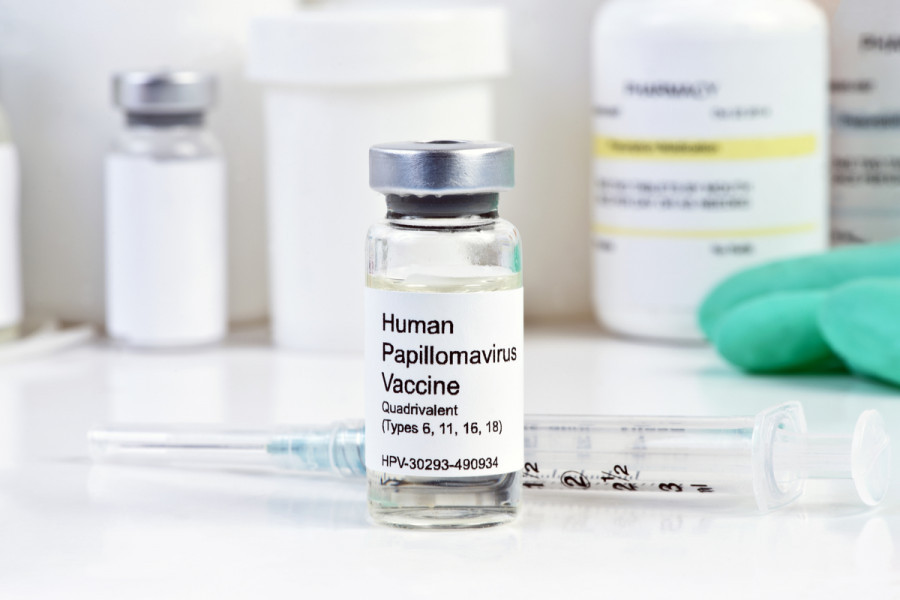Health
Over 5,000 girls of 11-13 years in Chitwan receive HPV vaccine
Human papillomavirus causes cervical cancer, a major cause of death among women.
Arjun Poudel
Girls between 11 and 13 years old in Chitwan district are being administered a vaccine against the human papillomavirus (HPV) by the Bharatpur-based BP Koirala Memorial Cancer Hospital.
The hospital had purchased 6,250 doses of the vaccine and around 5,000 girls have already been inoculated.
“Vaccine doses are being administered from schools and local health facilities free of cost,” said Dr Dej Kumar Gupta, director at the hospital. “We don’t have enough doses to vaccinate all eligible girls [aged between 11 and 13] in the district, so we will administer doses until the stock lasts.”
Human papillomavirus is a viral infection that spreads through skin contact. The virus causes cervical cancer, which is the second most common cancer in the developing world and a major cause of death among Nepali women. Experts say, early treatment prevents up to 80 percent of cervical cancer.
In 2019, the Ministry of Health and Population had allocated Rs77.7 million—Rs 27.5 million to the Immunisation Section at Family Welfare Division under the Department of Health Services and Rs50 million to the BP Koirala Memorial Cancer Hospital in Bharatpur—to introduce the vaccine.
The hospital purchased the vaccine spending around Rs4,000 per dose, but the government’s logistics management division failed to procure the vaccine doses on time leading to a freezing of the budget.
The World Health Organisation says HPV vaccination is recommended as part of a coordinated and comprehensive strategy to prevent cervical cancer and other diseases caused by the HPV.
HPV vaccination also figures in the government’s policy and programme for the fiscal year 2021-2022, but the budget was not allocated accordingly.
The government plans to administer the vaccine to the target population in 2023, and accordingly the Health Ministry has allocated a budget to purchase 20,000 doses.
Health authorities have planned to administer the vaccine to girls aged between 11 and 13 in nine districts.
“It will take another three months for the vaccine to arrive,” said Dr Sarbesh Sharma, director of the Management Division under the Department of Health Services. “We have just completed the procurement process and received the budget on Monday.”
Doctors say most cervical cancers are associated with the HPV, a sexually-transmitted infection. Widespread immunisation with the HPV vaccine could reduce the impact of cervical cancer and other cancers caused by the HPV worldwide.
Bhutan, Sri Lanka, Thailand and the Maldives have introduced HPV vaccines nationally, while India and Indonesia have introduced them in some districts.
Nepal, in 2016, piloted HPV vaccine in Chitwan and Kaski districts. All girls aged between 11 and 13 years were inoculated with two doses of the HPV vaccine at the time.
Nepal has also requested the Global Alliance for Vaccine and Immunisation (GAVI) to provide the HPV vaccine for free so that it could be included on the regular immunisation list.
Officials, however, said chances of Nepal getting the vaccine from GAVI in 2023 are slim due to a growing demand worldwide. Currently, only two companies produce WHO-prequalified HPV vaccines.
The Health Ministry had also sought help from the World Health Organisation during the Nepal visit of the Director General of the UN health body, Dr Tedros Adhanom Ghebreyesus, in April last year, to introduce the HPV vaccine on the regular immunisation list.
It is estimated that hundreds of women are diagnosed with cervical cancer every year in Nepal.
According to the BP Koirala Memorial Cancer Hospital in Bharatpur, more than 700 women suffering from cervical cancer seek treatment at the hospital every year.
The government provides free screening for cervical cancer at state-run health facilities across the country.
The World Health Organisation says the HPV is responsible for over 70 percent of cervical cancer cases in women. Countries which have included the HPV vaccine in their regular immunisation list have successfully reduced cervical cancer cases in women, according to doctors.
“We can prevent cervical cancer by vaccinating the target population on time,” said Gupta, director at BP Koirala Memorial Cancer Hospital. “Timely vaccination can save the lives of hundreds of women and girls.”




 9.89°C Kathmandu
9.89°C Kathmandu















